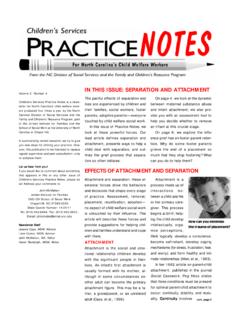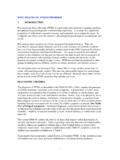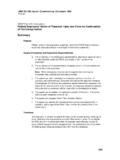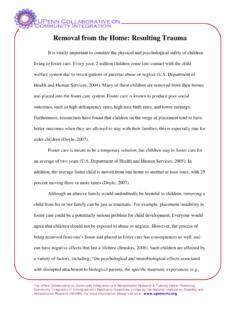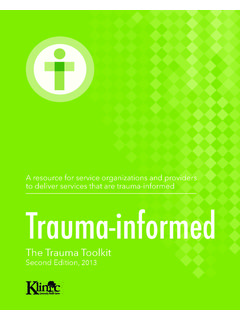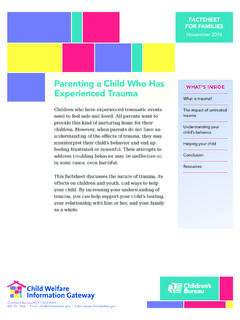Transcription of A Review of Sibling Bereavement- Impact and Interventions
1 Abc 1 A Review of Sibling bereavement - Impact and Interventions Author: Jennifer Holliday Date: August 2002 Aims of this Review To examine the Impact of Sibling bereavement on children To establish whether, and if so which, professional Interventions are effective in lessening any detrimental effects of bereavement . A search was conducted on Psych info and Medline. Particular emphasis was placed on finding studies that used a control group and validated instruments. 1. The Impact on children of the death of a Sibling There is an assumption that bereavement has an adverse effect on a child s life, leaving them at increased risk for significant psychological problems. According to Bank and Kahn (1982, cited in Gibbons 1992) surviving siblings of bereaved children may be particularly vulnerable to maladaptation.
2 Suicide Some studies have shown that the bereavement of a brother or sister in childhood has a significant Impact on the surviving child. Brent et al (1993) conducted a study to assess the psychiatric Impact of Sibling suicide on adolescents, although it was retrospective and consisted of a small sample size. They found that, in comparison to matched controls unexposed to bereavement , the adolescents who had lost a Sibling to suicide were more likely to suffer a new-onset episode of major depression. Most cases of depression began within a month of the death, and lasted for five months. All were still somewhat depressed six months later, at the time of the interview. Associated with new-onset depression were; previous psychiatric disorder, family history of psychiatric disorder and family history of depression.
3 A presence of these factors may predispose some siblings to depression after bereavement to a greater extent than others. Sudden Infant Death (SID) The behavioural features of children who had been bereaved of a Sibling through Sudden Infant Death (SID) were considered in a study conducted by Hutton and Bradley (1994). They noted that while there was considerable research on the psychological needs of the parents, there was a dearth of research on the effects for siblings. The bereaved siblings in this study were compared to a group matched on age, gender, family composition and social background. A time lag was incorporated in the design in order to assess the persistence of the behavioural problems.
4 Analysis of behaviour problems of the children was based on the validated Child Behaviour Checklist (CBCL) questionnaire and a semi-structured interview, which were administered to parents. It was found that the bereaved siblings had a higher rate of perceived behavioural difficulties than the comparison group, and fell abc 2 above the North American norm. Indeed, the average score for bereaved boys was above the cut-off point at which Achenbach and Eldelbrock (1981, cited in Hutton & Bradley 1994) advise that children should be referred for psychiatric help. Differences between the groups were notable in depression, aggression, social withdrawal and sex problems. The results indicate one of two things; either that SID had a significant Impact on the behavioural difficulties of the children, or that the mothers perception of the children s behaviour became distorted after the death.
5 Both of these interpretations are indicative of a detrimental Impact of Sibling death on children. Dissenting Views Harrington and Harrison (1999) argue that it is a mistake to necessarily conclude that bereaved children are at an elevated risk of maladaptive functioning. Although they don t directly address the effects on siblings, it is pointed out that no epidemiological surveys exist that show a strong correlation between bereavement and metal or behavioural disorders. It is yet to be shown that most grieving children demonstrate serious symptoms or dysfunctional behaviour. Indeed, bereavement cannot be seen as a strong predictor of depression when compared to other adverse events such as parental separation.
6 There have also been findings of personal growth as a response to bereavement . For example, Martinson and Campos (1991) were interested in the long-term effects of Sibling bereavement . They interviewed 31 subjects who had been aged 10-29 at the time of a Sibling s death. The interviews took place 7-9 years following the death. It was found that most subjects regarded the experience as having fostered their personal or family growth. Another study explored the effects of cancer on siblings and found both negative and positive consequences (Kramer 1981, cited in Murray 1999). Positive consequences of having a Sibling with cancer were an increased sensitivity and empathy for the patient and other individuals, enhanced personal maturation, and an increased appreciation for life.
7 Indirect Impact Nevertheless, there may be an indirect Impact resulting from the death of a child, related to the specific role that siblings have within the family structure. It may be that these secondary losses have a more profound Impact on the siblings, although much of the literature on this appears anecdotal. Indirect Impact - Closed Communication There is evidence to suggest that children are not hurt by exposure to death so much as by closed communication. Bowen (1978, cited in Walker 1993) suggests that this is especially pertinent to cases of cancer. Waechter (1971, cited in Walker 1993) found that children who were not protected from the prognosis of their Sibling and were able to talk openly to family members about it showed less anxiety than those who were not informed of prognosis.
8 Indirect Impact - Sibling Relationship There may be a particular response towards the death due the specific Sibling relationship that exists. Celia Hindmarch (2000) explains that Sibling relationships tend to be ambivalent, with love and affection interwoven with resentment and rivalry . This sort of relationship is usually unique to siblings. When a child dies, the Sibling relationship is broken and is irreplaceable. This may be especially prominent in a case where one twin has died. Older siblings may feel that they have not abc 3 provided the protection they should have in order for their brother or sister not to die. Conversely, younger siblings may feel insecure that their protector is no longer available (Hindmarch 2000).
9 According to Dora Black (1998) siblings may have felt resentment towards their Sibling due to the parents spending time with the child who is to die. Because of this children may feel triumphant at the time of death, which could subsequently lead to feelings of guilt. Indirect Impact - Role Of The Sibling Within The Family Hindmarch (2000) emphasises that the Impact of the death on the existing family system may affect the Sibling . The role of the Sibling within the family may be jeopardised by the death. First, the child may take the place of the dead child and be asked to fulfil roles previously associated with their dead brother or sister. Secondly, the surviving Sibling may become a scapegoat for the anger and guilt of their parents with regard to the child s death.
10 Thirdly, the status of the surviving child within the family is fundamentally changed; they may become treated as an only child or they may move from being the youngest child to the oldest. The parents may become more overprotective of the surviving child as an attempt to protect them from the same fate as their brother or sister; this may have an effect on the self-esteem and independence on the child (Gibbons 1992). Moreover, the Sibling may be affected indirectly from the grief suffered by the parents. The grief of the parents may lead to inadequate parenting towards the surviving child. As Brent (1983, cited in Gibbons 1992) stated Initially the parents may be unavailable and detached, preoccupied with their own grief.










